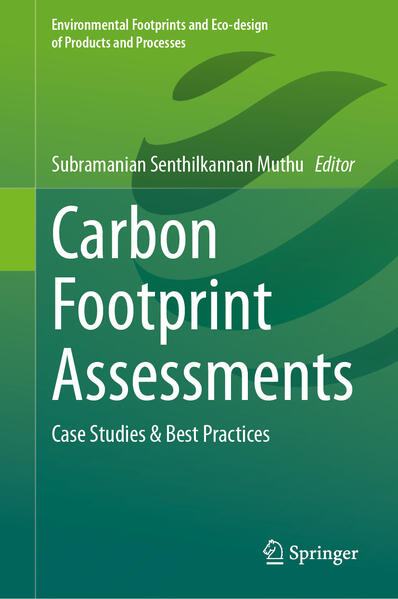
Zustellung: Do, 19.06. - Di, 24.06.
Versand in 1-2 Wochen
VersandkostenfreiBestellen & in Filiale abholen:
Climate change and its impacts are well known, and it is not hard to see the effects of climate change vulnerability to daily lives in many parts of the world. The need to assess and reduce carbon footprint is not specific to any industrial sector; rather it is an imperative to all aspects of industry. To that end, this book offers case studies detailing methods and best practices toward the assessment of carbon footprint in various industrial spaces. The chapters here highlight the urgency of measuring and alleviating the climate change impacts for various industrial sectors, and together they offer an overview of the current state of research on carbon footprint assessment in different industries ranging from textiles, agriculture, logistics, wine production, and more.
Inhaltsverzeichnis
1 Carbon Footprint Assessments. - 2 Carbon Footprints in Agriculture. - 3 An In-depth Exploration of Carbon Footprint Analysis in the Construction Sector with Emphasis on the Dam Industry. - 4 A Comprehensive Review of Carbon Footprints in the Wine Supply Chain in Italy. - 5 Carbon Footprint of Fashion. - 6 Strategies to Reduce the Carbon Footprint of Protective Face Masks. - 7 Nature-based Solutions to Reduce Carbon Footprint and Increase Resilience of Road Transportation Infrastructure. - 8 Carbon Footprint as a Tool to Improve Sustainability. - 9 Carbon Footprint Assessment of Agricultural Production Systems under the Variable System Boundary Scenarios. - 10 Offsetting Carbon Footprints. - 11 Climate Response and Nature-based Solutions. - 12 Implementing Circular Economy Principles in Road Transport. - 13 Best Practices Applied in Logistic Intern. - 14 Sowing the Future. - 15 Green Bonds and the Incentive to Decrease the Carbon Footprint in the Brazilian Agribusiness Sector.
Produktdetails
Erscheinungsdatum
23. November 2024
Sprache
englisch
Seitenanzahl
384
Reihe
Environmental Footprints and Eco-design of Products and Processes
Herausgegeben von
Subramanian Senthilkannan Muthu
Verlag/Hersteller
Produktart
gebunden
Abbildungen
VIII, 375 p. 70 illus., 62 illus. in color.
Gewicht
808 g
Größe (L/B/H)
241/160/25 mm
ISBN
9783031702617
Entdecken Sie mehr
Bewertungen
0 Bewertungen
Es wurden noch keine Bewertungen abgegeben. Schreiben Sie die erste Bewertung zu "Carbon Footprint Assessments" und helfen Sie damit anderen bei der Kaufentscheidung.









